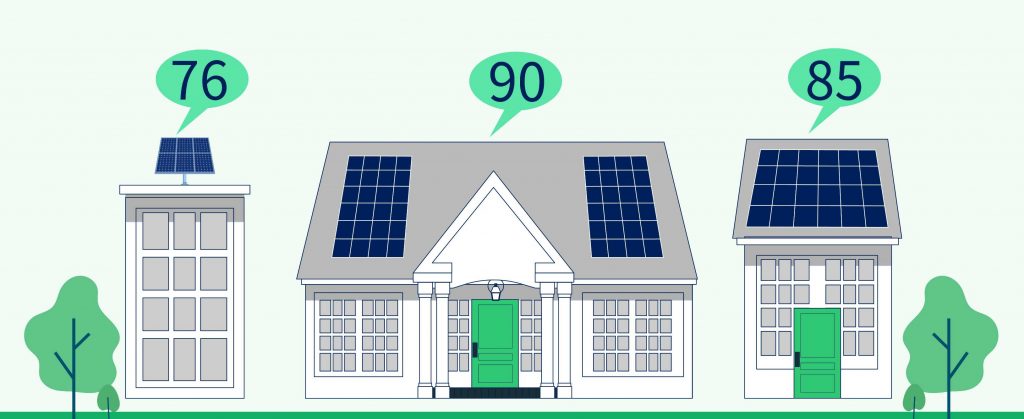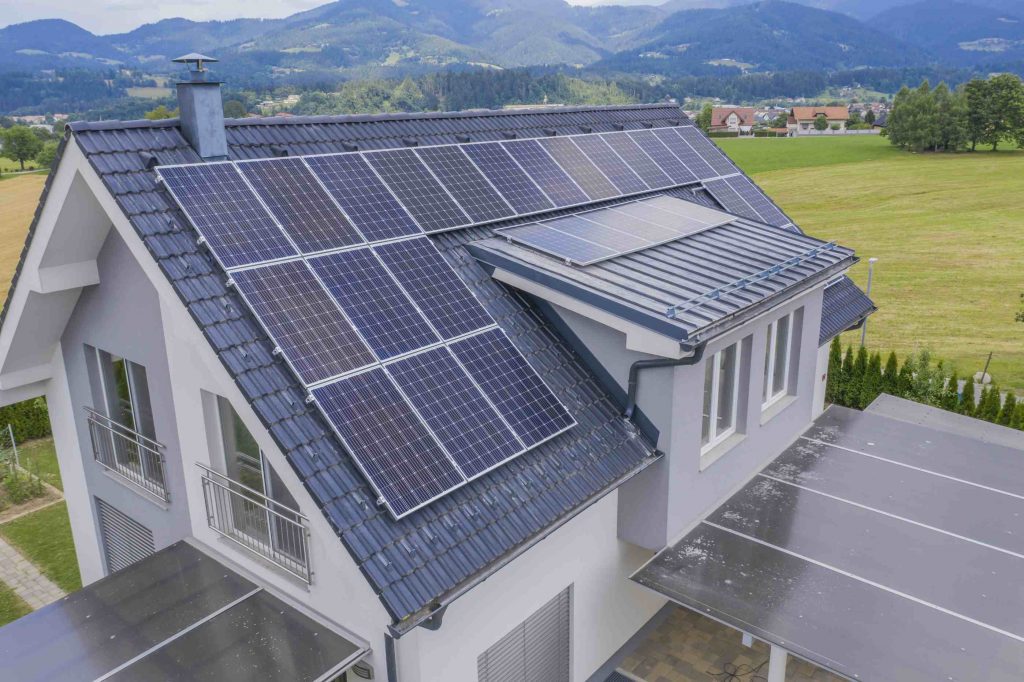What is a Sun Number Score?
Anyone who is considering installing solar panels will likely have hear the term “Sun Number Score”. Understanding what this score is and how it helps you understand your property’s potential to harvest solar energy is key in creating a solar panel array that is the best match for your property.

Key Takeaways
- A Sun Number Score is an increasingly standard measure of a property’s solar potential.
- The Sun Number is comprised of 4 key criteria: your building’s general suitability, your region’s climate, the electricity costs in your area, and the upfront investment to install solar panels
- Scores 70+ are ideal, but because of technologies such as microinverters, highly efficient solar panel arrays are possible for properties with much lower scores.
- Solar Energy is a proven way to increase property value.
- Governments around the world are extending tax credits to home and business solar energy installations.
What Is a Sun Number Score?
A Sun Number Score or a “Sun Score” is the numerical indication (normally following professional assessment) of a given property’s potential for solar collection. A Sun Score is a number from 1 to 100; the higher the Solar Number, the better the projected potential. Knowing a property’s Sun Number is important, because it provides critical information for array optimization, as well for as any accommodations that may be needed in order to match an optimal solution to a given project.
What Comprises a Sun Number?
There are four essential considerations when establishing a Sun Number prior to beginning any solar installation project. These four criteria—which are weighted differently based on their relative contribution to an optimized solar panel solution—are combined into the single number that becomes the property’s Sun Number score. These considerations are:
- Building Solar Score
- Regional Climate Score
- Electricity Rate Score
- Solar Cost Score
How Is a Sun Number Calculated and How Does It Work?
Sun Number scores are the sum of the following weighted scores that are normally determined by certified solar installation professionals when assessing a property for its solar power potential, including:
1) Building Sun Score (Max Score: 80 points): For maximum solar exposure, solar panels are typically installed on rooftops. Factors that are assessed as part of the Building Solar Score include the structure’s roof pitch, orientation, size, and shading.
Since this is by far the most heavily-weighted metric for determining your Sun Number, here are some key factors that impact your property’s ability to harvest solar power effectively:
- Roof pitch: The degree to which a roof is inclined impacts how much daily sunlight hits the solar panels and for how long.
- Roof orientation: In the northern hemisphere, ideal roof orientation for solar collection is south- facing because southern orientations maximize the amount of daily sun exposure. A west-facing installation is the next best option, followed by east-facing. Steeply pitched north-facing roofs may never see direct sunlight. However, with modern solar technology, north-facing roofs can be excellent candidates for solar panel installation.
- Roof size: Your roof will be assessed to determine that it is large enough to support a solar panel array that will produce all the electricity required to run your home.
- Roof shading: Nearby shade sources (such as trees and buildings) can cast shadow patterns that reduce your building’s solar energy harvesting potential.
A Building Sun Score should be at least 50—anything above 60 is ideal. South-facing roofs in the northern hemisphere (and north-facing roofs in the southern hemisphere) typically get a good amount of daily sunshine. Solar arrays on southern-facing roofs typically capture enough solar energy to power the average home. That said, based on a particular roof’s characteristics (e.g., steepness and location) technologies such as microinverters can also be used to optimize solar collection to a roof’s unique characteristics—and this is where a certified installer’s expertise will provide innovative solutions that match your project’s needs.
2) Regional Climate Score (Max Score: 8 points): Environmental conditions and seasonal weather patterns play a significant role in the amount of energy that solar panels can capture. Properties located in areas with frequently overcast skies, for example, will typically receive low Regional Climate Scores. Though, as you can see from the relative contribution it makes to the total Sun Score, living in a less sunny location is not the limiting factor it may once have been!
3) Electricity Rate Score (Max Score: 8 points): The higher the cost of electricity from the local grid, the more you will save (and faster!) by replacing conventional electricity with solar energy you harvest. In short, the higher the local electricity rate, the higher your Electrical Rate Score.
4) Solar Cost Score (Max Score: 4 points): This straightforward calculation is based on the local cost to install a solar panel system of suitable quality. Low solar installation prices reduce your upfront investment and the time required to recover your investment in panels, inverters, and other equipment. The lower the price, the higher the score.

What Is a Good Sun Number?
While a perfect score of 100 is ideal, a Sun Number above 70 indicates that solar energy is a fantastic investment for your property, with guaranteed long-term financial savings. The higher your Sun Number score, the better your property will collect solar energy and the more value solar panels will add to your property.
A great Sun Number means that you can confidently install your solar panel system and quickly begin powering your home with clean, renewable energy—great for your family and for the environment.
Beyond these benefits, did you know that solar panels have also been consistently proven to increase a home’s sale price?
What Happens If I Have a Low Sun Number Score?
If you have a low Sun Number score, all is not lost! Your property may still be an excellent candidate for solar panels, but it likely requires a customized solution with adaptations. Working with a qualified solar panel installer will help you understand your property’s specific challenges with respect to your solar options and how to overcome them. It may be possible, for example, to remove shade sources or to incorporate a microinverter-based solution.
Microinverter technology allows each solar panel in your array to be independently positioned so as to maximize direct sun exposure. This allows your rooftop space to be fully utilized even if your roof is complex and have different facings.
Moreover, Hoymiles microinverters enable each panel to work at its maximum capacity. This translates to maximizing energy production by up to 15%. The rationale is this: compared to traditional string inverters which typically incorporate a single instance of Maximum Power Point Tracking (MMPT) per string, microinverters enable MMPT in every solar panel in an array. This is important because even a single underperforming panel can reduce the output of the entire system.
The bottom line is that Hoymiles microinverters allow a wider range of home and business owners—even those with properties with relatively low Sun Number Scores—to install highly efficient, optimized solar arrays.

Are There Any Incentives for High Sun Number Scores?
According to Forbes, this is a wonderful time for US home owners to be considering solar panel systems, and to take advantage of the Federal Solar Investment Tax Credit (ITC). Many states and local governments also offer rebates for solar panel systems—some as high as 20% of the cost of the entire system.
As the world steers toward more sustainable forms of energy, an increasing number of countries offer similar tax incentives, rebates, and credits. Typically, the credit may be applied during the year the system was purchased and installed and can range from anywhere between 22% and 30% of the total installation cost of the solar panel system. Your certified energy systems installer will have the most up-to-date information on what incentives are available for your specific location.
If rebates aren’t enough to catch your attention, a recent Zillow analysis shows that solar-energy systems increase US home sale values by an average of 4.1% nationwide—an average added value of nearly 10,000 USD. Similarly, a study by the National Renewable Energy Laboratory (NREL) found that for every 1 USD saved on annual utility bills through solar energy, the value of the home increases by 20 USD. So not only does solar energy add value to your long-term property investment, but you also may well be eligible for fantastic incentives that help offset the initial investment costs.
